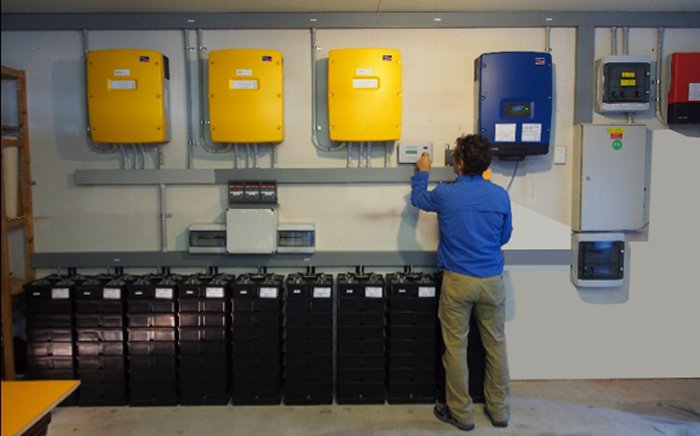
Aquion battery installation in Perth | Image: Aquion Energy
U.S. battery company Aquion Energy has emerged from Chapter 11 bankruptcy status with new owners at the helm and renewed confidence in its future.
—–
UPDATE 12 June, 2018. According to the Battery Test Centre (page 6 of the report): “Although Aquion was bought out in July 2017, it is not supporting existing products in any way, and all existing warranties are void. ”
——
Aquion Energy was previously manufacturing a zero-maintenance, non-flammable “salt water battery” (Aqueous Hybrid Ion – AHI) system that boasted 100% depth-of-discharge capability and other claimed advantages over lithium-ion chemistry batteries.
Like other manufacturers of solar batteries, Aquion had eyed the Australian market hungrily and racked up some sales here. The company posted case studies of Aquion battery performance in a couple of Australian installations in Perth and Melbourne.
Early this year, Aquion Energy was named “North American Company of the Year” in the 2017 Global Cleantech 100, adding to other accolades including the 2016 Platts Global Energy Award and PV Magazine Top Innovation Award 2016.
Then in March 2017, the wheels fell off the Pittsburgh-based company. It filed
this week
Greentech Media reports Juline-Titans LLC acquired the company at auction for USD $9.16 million in June – a fraction, says GTM, of the $190 million in venture capital and debt the company had raised from investors.
Aquion’s CEO seemed very upbeat about the company’s prospects under new ownership in a statement published yesterday, saying Aquion intends to deliver the lowest price per kWh-cycle battery in the world and expand its sodium-ion storage offerings into growing markets.
“We are confident with our committed business orders and aiming to build Aquion into a billion-dollar company in the upcoming years,” said Philip Juline. “We are only limited by our ability to ramp and scale our operations.”
SQ blogger Ronald wrote about the energy storage system last year – check out his Aquion battery review.

 RSS - Posts
RSS - Posts



Until now Aquion failed to deliver a reasonable price per kWh; they are almost double in price than Lithium Iron Phosphate, which at current market stay below 0.2 $/kWh
can you supply the salt batteries?
I haven’t heard of any being installed in Australia.